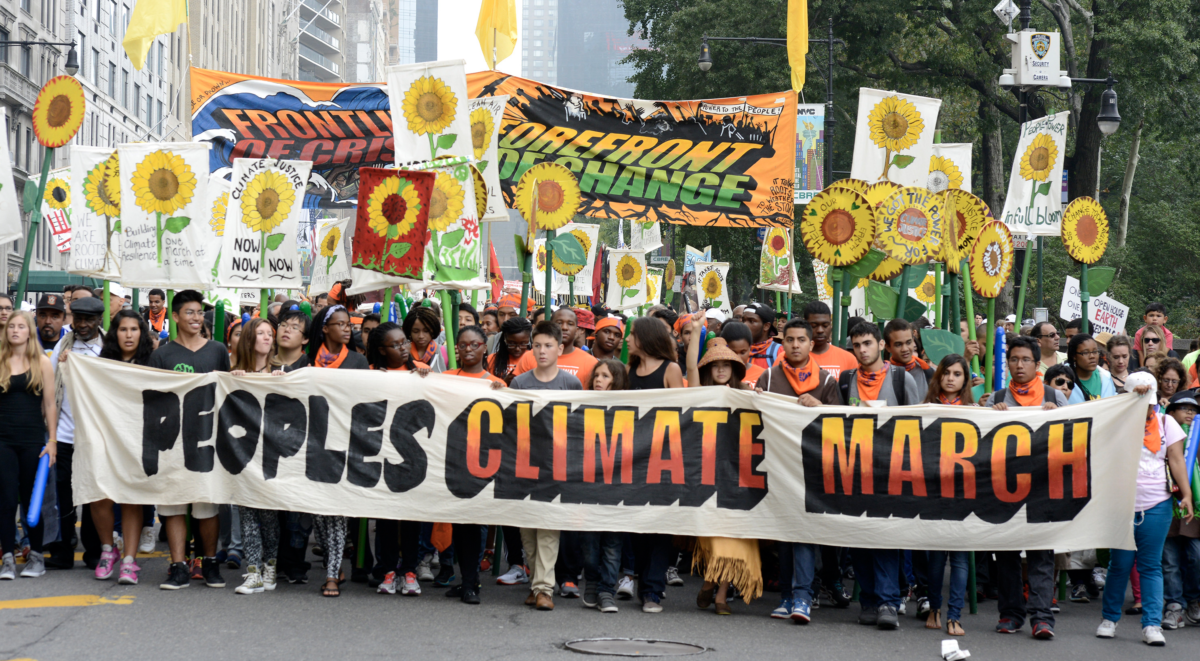The People’s Climate March and Economic Justice

As the September 21 People’s Climate March, the largest climate justice march in history, nears, James Haslam of the Vermont Workers’ Center writes, “In today’s world, it’s no longer possible to separate struggles for economic and social rights from the fight for a livable planet. … More and more of us are coming to the conclusion that the only real “solution” to climate change involves building a new economy and true democracy grounded in human rights and ecological stewardship. In this world, communities and workers would be in charge of investment priorities, and jobs would be based on standards set to ensure everyone’s right to live and work with dignity.”
Read Haslam’s full column from the Bennington Banner:
The People’s Climate March
I’m a parent of two little kids, but you don’t have to be a parent in order to care deeply about the kind of world we’re leaving to the next generation.
In the three years since Irene, with headlines dominated by droughts, super-storms, and mounting resource conflicts, more and more of us are confronting the possibility that our children may be inheriting a world far different from the one we’ve grown up in.
That’s why on September 21, I’ll be joining almost a thousand people from across Vermont who are packing into buses and heading to New York City for the People’s Climate March. Taking place just days before a major United Nations climate summit, the People’s Climate March promises to be the largest demonstration yet in the growing movement for climate justice, turning out hundreds of thousands into the streets.
I’ve never really considered myself an environmentalist, and have spent most of my career working with people fighting for workers’ rights, economic justice, and universal health care. But in today’s world, it’s no longer possible to separate struggles for economic and social rights from the fight for a livable planet. As bestselling author Naomi Klein points out in her soon-to-be-released book This Changes Everything: Capitalism vs. the Climate, “Climate change isn’t just another issue to be neatly filed between taxes and healthcare. It’s an alarm that calls us to fix an economic system that is already failing us in many ways.”
More and more of us are coming to the conclusion that the only real “solution” to climate change involves building a new economy and true democracy grounded in human rights and ecological stewardship. In this world, communities and workers would be in charge of investment priorities, and jobs would be based on standards set to ensure everyone’s right to live and work with dignity.
I’m talking about a world where people are able to stay home when we or a loved one is sick, and where our communities’ needs are met through recognizing our human rights to health care, education, housing, healthy food and healthy environment. All of these are interconnected and systems to provide them should be established as public goods for us all. The solution to climate change is a system change, one that is about justice, participation, and real democracy. The only way that any of this will happen is through organizing and building a people’s movement powerful enough to change the course of history and point us in the right direction. This must be a movement for everybody, which means we need to be dismantling the systems of oppression that keep people divided. In this way, I believe the fight against racism and police brutality in Ferguson, as well as the growing movements for migrant justice across the country are directly tied to our ability to turn things around for our planet.
Here in Vermont, we have a special responsibility because we can go on the offensive in a way that can help blaze the trail. As a result of the Healthcare Is A Human Right Campaign, we are already leading the way for other states in this country to have universal health care. Based on this success, the Vermont Workers’ Center joined together to form a Vermont Human Rights Council with progressive labor unions; climate justice groups like Rising Tide, 350-Vermont, and the Sierra Club; disability rights groups like the Vermont Center for Independent Living; immigrant rights groups like Migrant Justice, and many more. In addition to working together in solidarity, we are creating a vision of how we reinvent decision-making through our People’s Budget Campaign, which is based on the premise that our budget priorities must be rooted in meeting the needs of our communities, rather than forcing us to compete with one another for scarce public resources.
On September 21, this vision of solidarity will be on display as we march together for climate justice and human rights. There are already almost 15 buses full of people coming from Vermont (and you should join us!).
But even more important than marching in the streets of NYC is what we do when we all get back. With the stakes so high, its clear we don’t have time to spare. We must do everything we can to join with peers around the country and the world in being a catalyst to win transformative changes and build one movement for people and the planet.
More information is available about their work at www.workerscenter.org. If you are interested in learning more about the People’s Climate March go to http://peoplesclimate.org/.
James Haslam is executive director of the Vermont Workers’ Center in Burlington.
